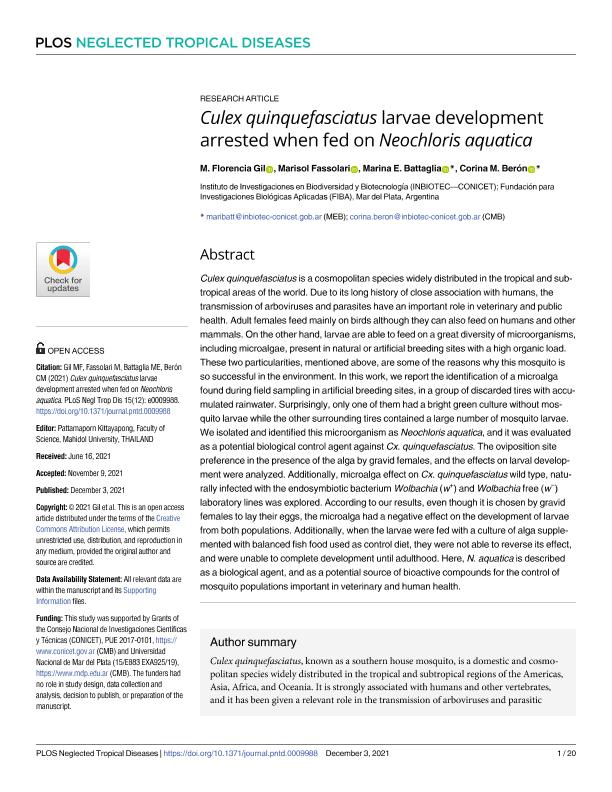Mostrar el registro sencillo del ítem
dc.contributor.author
Gil, María Florencia

dc.contributor.author
Fassolari, Marisol

dc.contributor.author
Battaglia, Marina Esther

dc.contributor.author
Berón, Corina Marta

dc.date.available
2022-09-26T17:30:14Z
dc.date.issued
2021-12
dc.identifier.citation
Gil, María Florencia; Fassolari, Marisol; Battaglia, Marina Esther; Berón, Corina Marta; Culex quinquefasciatus larvae development arrested when fed on Neochloris aquatica; Public Library of Science; Neglected Tropical Diseases; 15; 12; 12-2021; 1-20
dc.identifier.issn
1935-2735
dc.identifier.uri
http://hdl.handle.net/11336/170467
dc.description.abstract
Culex quinquefasciatus is a cosmopolitan species widely distributed in the tropical and subtropical areas of the world. Due to its long history of close association with humans, the transmission of arboviruses and parasites have an important role in veterinary and public health. Adult females feed mainly on birds although they can also feed on humans and other mammals. On the other hand, larvae are able to feed on a great diversity of microorganisms, including microalgae, present in natural or artificial breeding sites with a high organic load. These two particularities, mentioned above, are some of the reasons why this mosquito is so successful in the environment. In this work, we report the identification of a microalga found during field sampling in artificial breeding sites, in a group of discarded tires with accumulated rainwater. Surprisingly, only one of them had a bright green culture without mosquito larvae while the other surrounding tires contained a large number of mosquito larvae. We isolated and identified this microorganism as Neochloris aquatica, and it was evaluated as a potential biological control agent against Cx. quinquefasciatus. The oviposition site preference in the presence of the alga by gravid females, and the effects on larval development were analyzed. Additionally, microalga effect on Cx. quinquefasciatus wild type, naturally infected with the endosymbiotic bacterium Wolbachia (w+) and Wolbachia free (w−) laboratory lines was explored. According to our results, even though it is chosen by gravid females to lay their eggs, the microalga had a negative effect on the development of larvae from both populations. Additionally, when the larvae were fed with a culture of alga supplemented with balanced fish food used as control diet, they were not able to reverse its effect, and were unable to complete development until adulthood. Here, N. aquatica is described as a biological agent, and as a potential source of bioactive compounds for the control of mosquito populations important in veterinary and human health.
dc.format
application/pdf
dc.language.iso
eng
dc.publisher
Public Library of Science

dc.rights
info:eu-repo/semantics/openAccess
dc.rights.uri
https://creativecommons.org/licenses/by-nc-sa/2.5/ar/
dc.subject
Culex
dc.subject
Neochloris
dc.subject
biocontrol
dc.subject.classification
Bioquímica y Biología Molecular

dc.subject.classification
Ciencias Biológicas

dc.subject.classification
CIENCIAS NATURALES Y EXACTAS

dc.title
Culex quinquefasciatus larvae development arrested when fed on Neochloris aquatica
dc.type
info:eu-repo/semantics/article
dc.type
info:ar-repo/semantics/artículo
dc.type
info:eu-repo/semantics/publishedVersion
dc.date.updated
2022-09-21T23:55:59Z
dc.journal.volume
15
dc.journal.number
12
dc.journal.pagination
1-20
dc.journal.pais
Estados Unidos

dc.description.fil
Fil: Gil, María Florencia. Consejo Nacional de Investigaciones Científicas y Técnicas. Centro Científico Tecnológico Conicet - Mar del Plata. Instituto de Investigaciones en Biodiversidad y Biotecnología; Argentina
dc.description.fil
Fil: Fassolari, Marisol. Consejo Nacional de Investigaciones Científicas y Técnicas. Centro Científico Tecnológico Conicet - Mar del Plata. Instituto de Investigaciones en Biodiversidad y Biotecnología; Argentina
dc.description.fil
Fil: Battaglia, Marina Esther. Consejo Nacional de Investigaciones Científicas y Técnicas. Centro Científico Tecnológico Conicet - Mar del Plata. Instituto de Investigaciones en Biodiversidad y Biotecnología; Argentina
dc.description.fil
Fil: Berón, Corina Marta. Consejo Nacional de Investigaciones Científicas y Técnicas. Centro Científico Tecnológico Conicet - Mar del Plata. Instituto de Investigaciones en Biodiversidad y Biotecnología; Argentina
dc.journal.title
Neglected Tropical Diseases

dc.relation.alternativeid
info:eu-repo/semantics/altIdentifier/doi/https://doi.org/10.1371/journal.pntd.0009988
dc.relation.alternativeid
info:eu-repo/semantics/altIdentifier/url/https://journals.plos.org/plosntds/article?id=10.1371/journal.pntd.0009988
Archivos asociados
